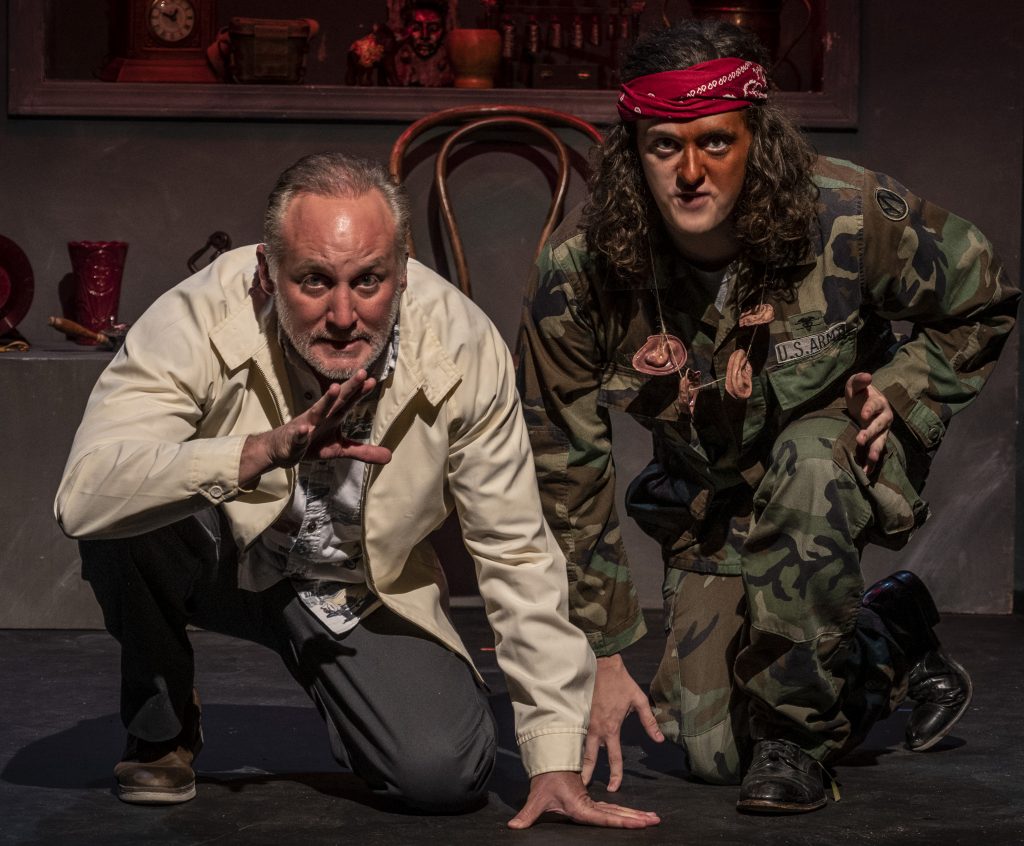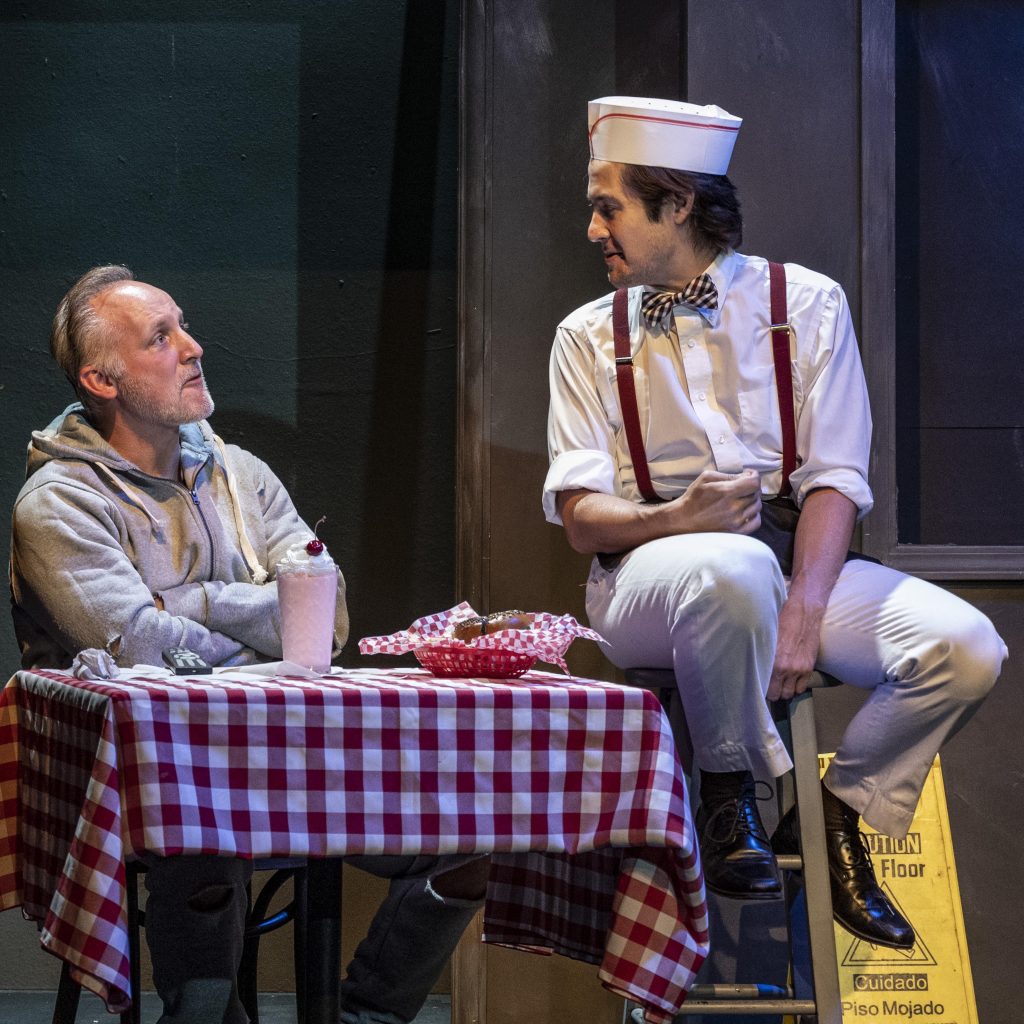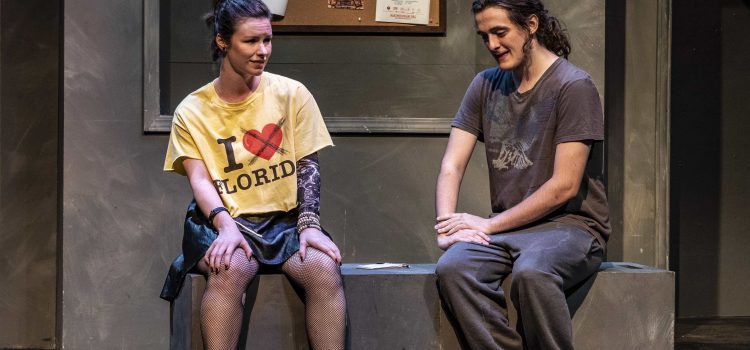By CB Adams
Before the lights dimmed and the 8th annual LaBute New Theater Festival began, this reviewer felt pity instead of anticipation – pity for the nine playwrights who had to endure a two-year, pandemic-induced delay for their works to be fretted and strutted upon the intimate performance space at the Gaslight Theater.
During the festival’s four-week run, the St. Louis Actors’ Studio presents two sets of five one-act plays selected in 2020 – a Whitman’s Sampler (something for everyone!) of short dramas. Each slate includes “St. Louis,” written by the festival’s founder and namesake, the Tony-nominated, acclaimed writer and director Neil LaBute.
Two years may have felt like an eternity to playwrights and public alike, but the first set of one acts, running from July 8–17, delivers a collectively gratifying experience resonating with relevance to the current zeitgeist.
The first set includes Aren Haun’s “What Else is New,” John Doble’s “Twilight Time,” Willie Johnson’s “Funny Thing,” and Fran Dorf’s
“Time Warp,” as well as LaBute’s “St. Louis.”
Experiencing this evening of one acts is like reading a short-story collection. You might not enjoy every play (not all in the first set are one-hit wonders), but taken together, they are engaging, thought-provoking and satisfying. When soliciting for one acts, the LaBute
Festival seeks plays that feature no more than four characters. They should be crafted specifically to exploit the Gaslight’s intimate, 18-foot square performance space with quick changes in scenery, setting and set moves.

For theater-goers who love plays that focus on the fundamentals of dramaturgy – plot, character and theme – the LaBute Festival is a must-see, based on this first slate.
The plays presented this year are diverse, yet share a common thread, if not a common theme, of human connectedness:
“What Else is New,” set in a diner, involves Bruno (and his suitcase), an unhoused loner (replete with an annoying need for conversation and more tics and twitches than Brad Pitt in the film “12 Monkeys”) and Mark, a disinterested college art student who works the counter. t’s a marvel to watch the two characters circuitously connect.
“Twilight Time,” concerns a chance encounter between Benjamin and Geraldine, two disaffected youths who discover they are both planning their suicides. Though not as humorously death-drenched as “Harold and Maude,” they connect over common political and other opinions and soon make plans to live, perhaps happily ever after.
“Funny Thing” is anything but funny as the four-month relationship between Older Man and Younger Man is stuffed into a blender and set to frappe. The resulting, non-chronological plot makes frequent pivots that are easy to follow, thanks to fine acting and effective lighting changes.
No one dances in “Time Warp,” but, as the song goes, “…With a bit of a mind flip / You’re into the time slip / And nothing can ever be the same…” For those of us who like stories that explore the possibilities presented by punctures in the time- space continuum, “Time Warp” delivers a mind-bending – and ultimately harrowing – tale involving Brian, a Vietnam War army psychiatrist, his wife, Beth, a curiosity shopkeeper, CG Young, and a specter-like painter and fellow soldier, Joey Passarelli. The warping of time and circumstance ensues, though not in a science fiction sort of way.
LaBute’s “St. Louis” (presented in both sets of the festival) could have been titled Stand and Deliver because that’s what this play’s three characters do: they stand and deliver (as does the entire play itself). St. Louis does not concern itself with Ted Drewes, the Arch or any other tourist destinations. There are a few compass- point references to St. Louis, such as the Central West End, but the true location
of this one act is the triangulated world and relationships of the three monologists, She, Her and Him. The climax of the relationship – the connection – among these characters is too good to spoil.
But, climax aside, the most noteworthy achievement is how the story is unfolded by the three characters, each in a pool of
light and each speaking as if to their own offstage interlocutor. Separately, and yet collectively, they stand and deliver their part of a shared, very personal history. Under the deft direction of Spencer Sickmann (himself a seasoned actor), the actors collectively embrace their characters and deliver these short plays with confidence, believability and chemistry.
And, in the case of “Twilight Time,” they surpass the play itself. Mitch Henry Eagles plays triple duty in “What Else is New,” “Funny Thing” and “Time Warp.” All are fine performances, but the standout is as the Younger Man in “Funny Thing.” His character is whiplashed by the on-again/off-again relationship he shares with Older Man and Eagles easily flips between “should I stay” or “should I go?”
Bryn McLaughlin does double duty as Geraldine in “Twilight Time” and She in “St. Louis.” Her performance in the former is the strongest in that play, and in the latter, she’s even better as she projects a strong, confident counterpoint to the bro-ish Him. As Him, Brock
Russell plays a character one loves to hate, or vice versa, and that dichotomy is testament to his ability to fully reveal the complexities of Him.
Eric Dean White demonstrates tremendous range playing the twitchy chatterbox Bruno in “What Else is New” and, a couple of one acts later, as the sensitive psychiatrist and husband in “Time Warp.” The nervous energy he pours into his Bruno is as exhausting as it is exhilarating.
In the case of these one acts, to call the sets, lighting and costumes bare bones is a compliment. As in most literary short stories, there’s nothing extraneous and everything must serve a purpose in black-box one acts. In this first slate of plays, that’s exactly what Patrick Huber achieves with the flexible sets and lighting, as does Carla Landis Evans with the costume designs.

Set One of the LaBute New Theater Festival runs July 8-17 at at the Gaslight Theater, 358 N Boyle Ave. Set Two runs from July 22–31. Times are 3 p.m. on Sundays and 8 p.m. Friday and Saturday. For more information, www.stlas.org
All photos by Patrick Huber

CB Adams is an award-winning fiction writer and photographer based in the Greater St. Louis area. A former music/arts editor and feature writer for the St. Louis Globe-Democrat, his non-fiction has been published in local, regional and national publications. His literary short stories have been published in more than a dozen literary journals and his fine art photography has been exhibited in more than 40 galley shows nationwide. Adams is the recipient of the Missouri Arts Council’s highest writing awards: the Writers’ Biennial and Missouri Writing!. The Riverfront Times named him, “St. Louis’ Most Under-Appreciated Writer” in 1996.



